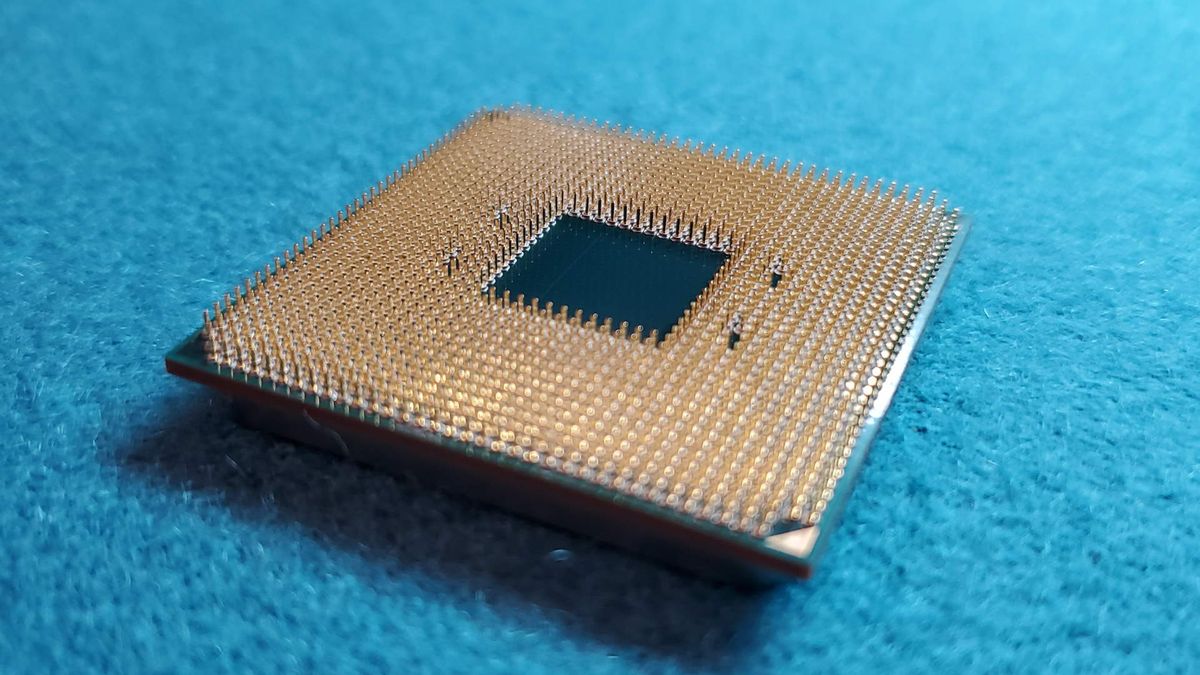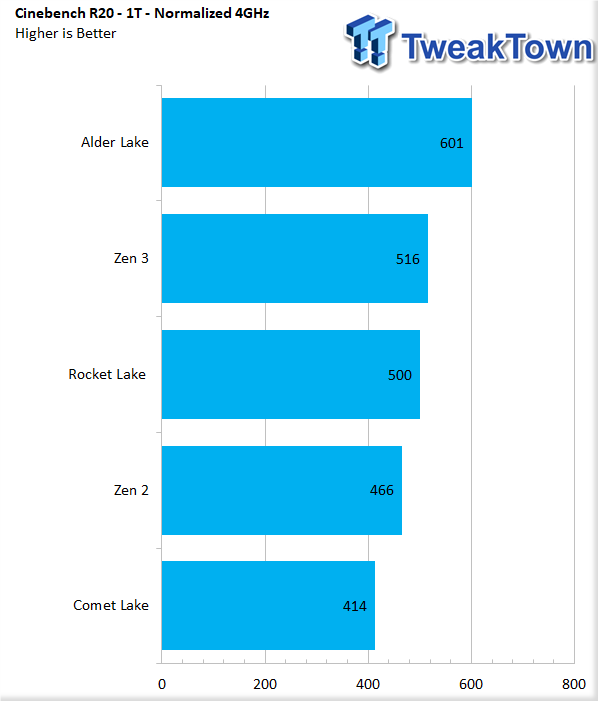The 7600x will most likely not even outperform the 12600k. The 7800x might be - in best case scenario, tie a 12700k / 5900x. Of course AMD might pull an Intel and surprises, but assuming it sticks to zen 3 performance increases, it wouldn't surprise me if their 300$ MSRP CPU was 4c/8t this time around and slower than the 5600x. I mean we've seen it with zen 3, we might see it again with zen 4, who knowsDo you think the 7600X or 7800X will outperform the 5950X?
-
Competitor rules
Please remember that any mention of competitors, hinting at competitors or offering to provide details of competitors will result in an account suspension. The full rules can be found under the 'Terms and Rules' link in the bottom right corner of your screen. Just don't mention competitors in any way, shape or form and you'll be OK.
You are using an out of date browser. It may not display this or other websites correctly.
You should upgrade or use an alternative browser.
You should upgrade or use an alternative browser.
Raptor Lake Leaks + Intel 4 developments
- Thread starter g67575
- Start date
More options
Thread starter's postsI refer to my reply to Dave2150, you're doing the same thing.40% faster is a small improvement? LOL
It'll be awesome if the 13600/F/K/KF can beat a 5950X in everything ST or MT. It's about time really, assuming it launches at the same £280-300 price point, with DDR5 being a good price now, it will be a good platform if you never intend to upgrade the CPU, and should be a reasonable total cost vs the outgoing 5950X which is still £450-500.
It's out around the start of November by the look of the latest leaks, so it'll have only taken 2 years from Zen3 release to have caught up/surpassed the MT lead, doubt anything will beat the X3D if you are a gamer though, so might be a tough choice for some, especially those that don't get to build regularly as we won't be certain which will age better.
It's out around the start of November by the look of the latest leaks, so it'll have only taken 2 years from Zen3 release to have caught up/surpassed the MT lead, doubt anything will beat the X3D if you are a gamer though, so might be a tough choice for some, especially those that don't get to build regularly as we won't be certain which will age better.
Permabanned
- Joined
- 28 Sep 2018
- Posts
- 0
It'll be awesome if the 13600/F/K/KF can beat a 5950X in everything ST or MT. It's about time really, assuming it launches at the same £280-300 price point, with DDR5 being a good price now, it will be a good platform if you never intend to upgrade the CPU, and should be a reasonable total cost vs the outgoing 5950X which is still £450-500.
It's out around the start of November by the look of the latest leaks, so it'll have only taken 2 years from Zen3 release to have caught up/surpassed the MT lead, doubt anything will beat the X3D if you are a gamer though, so might be a tough choice for some, especially those that don't get to build regularly as we won't be certain which will age better.
One thing to note about X3D is that it's not a definitive win across the board. If I played a wide selection of games, I'd gotten the 12900k (goes without saying, way more fun to tune as well) but given that I just sim, the x3d was a no brainer.
Last edited:
The next gen X3D Zen 4 CPUs will be ahead of Intel's 13th in games, due to the 8-10% increase in IPC, 5ghz all core frequencies and a ton of cache.
Zen 3 is ~20% behind Alder Lake, according to this:

With Zen 4's IPC and clock improvements, AMD will close the gap with the Golden Cove microarchitecture. Should get around another 9-10% on top of that in games with Zen 4 X3D CPUs.
Zen 3 is ~20% behind Alder Lake, according to this:
With Zen 4's IPC and clock improvements, AMD will close the gap with the Golden Cove microarchitecture. Should get around another 9-10% on top of that in games with Zen 4 X3D CPUs.
Do we have confirmation that zen 4 Vcache will clock to 5ghz?The next gen X3D Zen 4 CPUs will be ahead of Intel's 13th in games, due to the 8-10% increase in IPC, 5ghz all core frequencies and a ton of cache.
Zen 3 is ~20% behind Alder Lake, according to this:

With Zen 4's IPC and clock improvements, AMD will close the gap with the Golden Cove microarchitecture. Should get around another 9-10% on top of that in games with Zen 4 X3D CPUs.
It will require some more work to get the V-Cache working well at higher voltages apparently (to support higher clocks), currently the 5800X3D is limited to 1.35v. Link here:

 www.pcgamer.com
www.pcgamer.com
It will be the 2nd gen of V-cache chips though, so I'm optimistic. Maybe the voltage constraints were part of the reason why it took a while to release the 5800X3D?
If not, The 5800X3D still grants ~9% higher FPS on average vs the 5800X, despite lower clock speeds. But, the main benefit will be higher min. framerates in games.

'Locked' AMD Ryzen 7 5800X3D overclocked to 5.14GHz
Using MSI's expensive Godlike X570 motherboard, but that's still impressive.
It will be the 2nd gen of V-cache chips though, so I'm optimistic. Maybe the voltage constraints were part of the reason why it took a while to release the 5800X3D?
If not, The 5800X3D still grants ~9% higher FPS on average vs the 5800X, despite lower clock speeds. But, the main benefit will be higher min. framerates in games.
Last edited:
There's some early rumours of both Intel's 13th gen and Zen 4 CPUs needing 1.45-1.5v at stock settings.
In theory, doesn't this mean that even motherboards with VRM core current power limited to 150 Amps (maximum), will be able to supply upto 225w to CPUs, assuming a Vcore of 1.5v?
Presumably, the VRMs will have to be able to officially support these higher voltages, to guarantee compatibility?
In theory, doesn't this mean that even motherboards with VRM core current power limited to 150 Amps (maximum), will be able to supply upto 225w to CPUs, assuming a Vcore of 1.5v?
Presumably, the VRMs will have to be able to officially support these higher voltages, to guarantee compatibility?
Last edited:
There's some early rumours of both Intel's 13th gen and Zen 4 CPUs needing 1.45-1.5v at stock settings.
In theory, doesn't this mean that even motherboards with VRM core current power limited to 150 Amps (maximum), will be able to supply upto 225w to CPUs, assuming a Vcore of 1.5v?
Presumably, the VRMs will have to be able to officially support these higher voltages, to guarantee compatibility?
What do you mean? zen3 already runs at 1.5v
Fair enough. Does that mean that AM4 and AM5 motherboards with VRMs rated for 150 amps should support all Zen 4 or Zen 5 CPUs, respectively*? Without any CPU power throttling at the rated turbo speeds?
Put another way, what should people look for in an AMD or Intel board (Zen 4 and Intel 13th gen), as a minimum to avoid power throttling at the rated turbo speeds?
It looks like because of the higher TDPs (and higher power usage at turbo speeds) of the 12th and 13th gen, vs Zen 4, AMD will have an advantage regarding motherboard power requirements for the CPU socket.
For the base CPU frequencies, it looks like upto 170w will be the maximum power consumed on AM5. With a maximum of ~230w at the highest turbo frequencies.
* This is based on the assumption that 1.5 volts x 150 amps = upto 225 watts
Or, alternatively 1.5 volts x 200 amps = upto 300 watts
Put another way, what should people look for in an AMD or Intel board (Zen 4 and Intel 13th gen), as a minimum to avoid power throttling at the rated turbo speeds?
It looks like because of the higher TDPs (and higher power usage at turbo speeds) of the 12th and 13th gen, vs Zen 4, AMD will have an advantage regarding motherboard power requirements for the CPU socket.
For the base CPU frequencies, it looks like upto 170w will be the maximum power consumed on AM5. With a maximum of ~230w at the highest turbo frequencies.
* This is based on the assumption that 1.5 volts x 150 amps = upto 225 watts
Or, alternatively 1.5 volts x 200 amps = upto 300 watts
Last edited:
It's interesting looking at this motherboard VRM tier list:

 linustechtips.com
linustechtips.com
It looks like with Zen 3, you can get away with a 100 amp board for a 5800X, and a 125 amp board for a 5900X (apparently that's enough to max them out).
Still, maybe worth spending a bit more to get something like a Gigabyte B550M Aorus Pro.
It's a shame there's no equivalent VRM lists for Intel boards, showing their maximum current draw.

Motherboard VRM Tier List v2 (currently AMD only)
Credit to: @LukeSavenije The following list is based on facts, ranked on power delivery and known problems. The list will include boards that support CPU overclocking available at retail from different brands. There are still differences in performance among boards of the same tier. As a result, ...
 linustechtips.com
linustechtips.com
It looks like with Zen 3, you can get away with a 100 amp board for a 5800X, and a 125 amp board for a 5900X (apparently that's enough to max them out).
Still, maybe worth spending a bit more to get something like a Gigabyte B550M Aorus Pro.
It's a shame there's no equivalent VRM lists for Intel boards, showing their maximum current draw.
Last edited:
You can just divide watts by the voltage if you want an idea how many amps something is pulling.It's interesting looking at this motherboard VRM tier list:

Motherboard VRM Tier List v2 (currently AMD only)
Credit to: @LukeSavenije The following list is based on facts, ranked on power delivery and known problems. The list will include boards that support CPU overclocking available at retail from different brands. There are still differences in performance among boards of the same tier. As a result, ...linustechtips.com
It looks like with Zen 3, you can get away with a 100 amp board for a 5800X, and a 125 amp board for a 5900X (apparently that's enough to max them out).
Still, maybe worth spending a bit more to get something like a Gigabyte B550M Aurus Elite or Pro.
It's a shame there's no equivalent VRM lists for Intel boards, showing their maximum current draw.
Fair enough. Does that mean that AM4 and AM5 motherboards with VRMs rated for 150 amps should support all Zen 4 or Zen 5 CPUs, respectively*? Without any CPU power throttling at the rated turbo speeds?
Put another way, what should people look for in an AMD or Intel board (Zen 4 and Intel 13th gen), as a minimum to avoid power throttling at the rated turbo speeds?
It looks like because of the higher TDPs (and higher power usage at turbo speeds) of the 12th and 13th gen, vs Zen 4, AMD will have an advantage regarding motherboard power requirements for the CPU socket.
For the base CPU frequencies, it looks like upto 170w will be the maximum power consumed on AM5. With a maximum of ~230w at the highest turbo frequencies.
* This is based on the assumption that 1.5 volts x 150 amps = upto 225 watts
Or, alternatively 1.5 volts x 200 amps = upto 300 watts
When I said 1.5v I meant zen3 chips already by themselves regularly run at 1.5v - they do this at idle or very low load. My 5950x at full load when stock drops down to 1.0v and with overclocked 1.3v. At both of these it's 130w and 260w.
As per above you can back it up to find the amps. So 130w/1.3v = 130amps for a stock 5950x. And 260w/1.3v = 200amps for overclocked 5950x.
As for my motherboard it's a x570 Asus formula, it has a 16 phase 60amp VRM configuration - for all intended purposes you can just do 16x60 = 960amps capacity, which means the 200amps my 5950x can pull doesn't even tickle the board
Last edited:
That's very useful to know, thanks.As for my motherboard it's a x570 Asus formula, it has a 16 phase 60amp VRM configuration - for all intended purposes you can just do 16x60 = 960amps capacity, which means the 200amps my 5950x can pull doesn't even tickle the board
Intel's Core 2 Extreme & Core 2 Duo: The Empire Strikes Back
I think Raptor Lake will have the same effect. Full circle.
The key difference I guess was that those chips weren't already clocked to 95% of their potential.
Looking at this, we can see that Zen 4 will need to be clocked at around 5.0ghz to keep up with Golden cove (in single core performance):

That's because the IPC increase of Zen 4 is 8% vs Zen 3, not enough to overtake Golden Cove at the same clock rate.
So, it seems likely that AMD will need V-cache to overtake Golden Cove in games, assuming the same clock rate for Zen 4 and Golden Cove.
I supose there's other factors to take into account too though, like differences in DDR5 RAM support and how the memory controller operates on Zen 4 (apparently it can operate at 1:1 with DDR5).

That's because the IPC increase of Zen 4 is 8% vs Zen 3, not enough to overtake Golden Cove at the same clock rate.
So, it seems likely that AMD will need V-cache to overtake Golden Cove in games, assuming the same clock rate for Zen 4 and Golden Cove.
I supose there's other factors to take into account too though, like differences in DDR5 RAM support and how the memory controller operates on Zen 4 (apparently it can operate at 1:1 with DDR5).
Last edited:
Looking at this, we can see that Zen 4 will need to be clocked at around 5.0ghz to keep up with Golden cove (in single core performance):
So, it seems likely that AMD will need V-cache to overtake Golden Cove in games, assuming the same clock rate for Zen 4 and Golden Cove.
And we saw the gaming demo of the 16 core Zen 4 doing average 5.5GHz on multiple cores. A single core could well go higher again, so I don't think V cache will be necessary to retake the gaming crown.
Zen 4 seems to be about getting the clocks up, not IPC increases. Intel have largely kept their competitive edge through MOAR MEGAHURTZ!!!1!! and that seems to have trickled into the collective (ill-informed) consciousness that faster clocks = better CPUs. So Zen 4 seems to be an attempt to take that last competitive metric from Intel.
Last edited:
This is generally true, but I think we are seeing diminishing returns, particularly over 5ghz, which seems to require much higher voltages than 4Ghz. Meteor Lake (on 'Intel 4' seems to be built to run efficiently at 1.3v and maybe higher. Any gains >5ghz will have to be paid for by the customer, with higher power consumption, better/chonkier coolers and likely better motherboard VRMs.that faster clocks = better CPUs.
Nowadays, with many games using a lot of cache, overclocking the CPU cache ratios as high as possible seems to have more impact on minimum framerates in games, so this interests me more.
Last edited:
This has never been true, at least not in the way the collective consciousness thinks it's true.This is generally true
If this was true, the FX 9590 should have been the ultimate consumer CPU given it was the first to have a 5GHz clock out of the box, but Intel crushed it.
If this was true, Pentium 4 should have ruled the roost, but AMD humiliated them.
If this was true, Comet Lake and Rocket Lake should never have succumbed to Zen 3.
High clocks don't mean anything in and of themselves.
For Intel maybe. Zen 4 doing 5.5GHz sustained boost on multiple cores in a purely out-of-the-box config with only a 35W uplift in the platforms maximum design power isn't "diminishing returns".but I think we are seeing diminishing returns, particularly over 5ghz, which seems to require much higher voltages than 4Ghz

